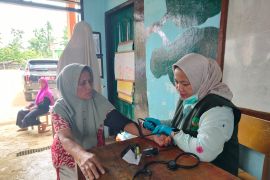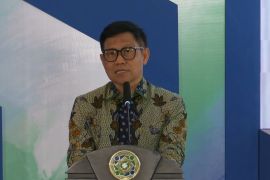Indonesia is in the fifth position, with the most number of diabetes patients, reaching 19.5 millionJakarta (ANTARA) - Deputy Minister of Health Dante Saksono Harbuwono called for applying the three crucial concepts of education, early detection, and treatment for handling diabetes.
"First, education is needed for people, who have not had diabetes. Then, the second is early detection of people, who have diabetes risk factors. The third is to treat until the risk factors for complications are controlled in people, who have been diagnosed," Harbuwono noted at the opening of the webinar titled "Prevent and Control Diabetes for Your Future" in Jakarta, Monday.
The deputy minister affirmed that the three concepts were part of a diabetes control program for the community that was compiled by the Ministry of Health in an integrated manner with the health system transformation.
In terms of education programs, the ministry conducts these programs through various channels, such as social media, webinars, YouTube, websites, and podcasts. In addition, the ministry readies teaching materials to be included in the school curriculum, Harbuwono noted.
World Diabetes Day, which is commemorated every November 14, carries the global theme of "Education to Protect Tomorrow" for this year. Meanwhile, Indonesia adopts the theme to "Prevent and Control Diabetes for Your Future."
Through this theme, Harbuwono is optimistic that Indonesia can initiate practical and easy education for the community, for instance, informing the public about the sugar content in popular beverages, such as milk tea, sweet coffee, and sweet tea. This is important because these drinks are not only affordable but can also be easily purchased through online food delivery.
Regarding early detection of diabetes, the ministry encourages programs by screening risk factors both through symptom and sugar checks at all health facilities. Meanwhile, in connection with diabetes treatment, his side strengthens standardized treatment at community health center (puskesmas), clinics, and hospitals.
Harbuwono highlighted that the health burden associated with diabetes was increasing in the world and in Indonesia. According to the International Diabetes Federation (IDF), some 530 million adults suffer from diabetes, and this figure is forecast to increase to 783 million in 2045.
"Indonesia is in the fifth position, with the most number of diabetes patients, reaching 19.5 million. This increases deaths from diabetes in the third place and contributes to increasing the cost of treating diabetes complications, including heart disease, stroke, and kidney failure to Rp21.6 trillion in 2021,” he noted.
On the same occasion, the ministry's Director of Prevention and Control of Non-communicable Diseases, Eva Susanti, said that diabetes is a significant health burden since it caused 6.7 million deaths in 2021.
She noted that while 44 percent of diabetes cases were diagnosed, it was generally type 2 diabetes that was preventable.
"This burden will increase because three out of four cases of diabetes in the world are in countries with low and middle income," she remarked.
Related news: Community role key in controlling non-communicable diseases: ministry
Related news: Need to bolster diabetes risk screening: Deputy Minister
Related news: JFHMM G20 affirms commitment to strengthen global health architecture
Translator: Rizka Khaerunnisa, Resinta S
Editor: Sri Haryati
Copyright © ANTARA 2022












